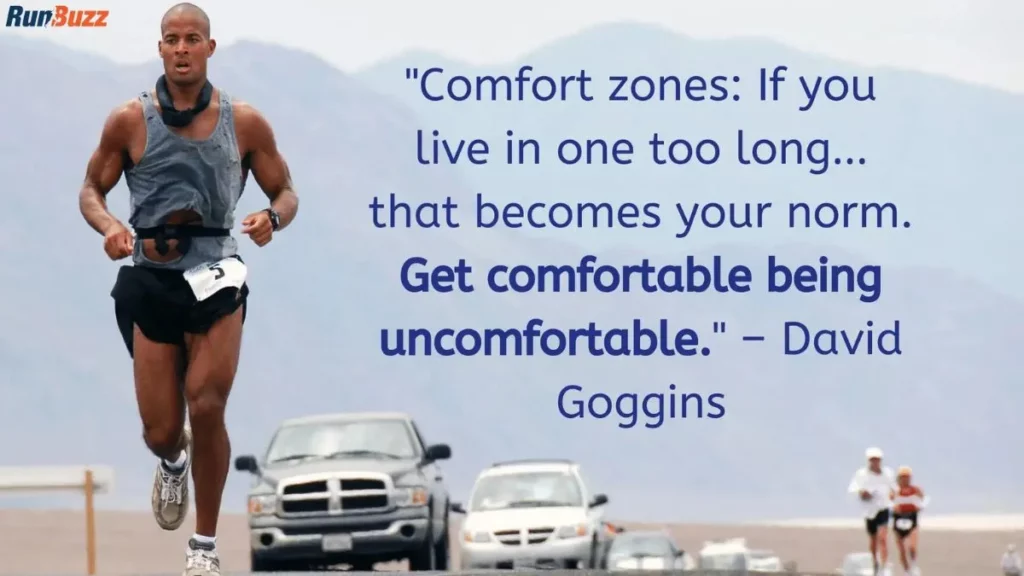How to build mental toughness is a key skill for runners looking to improve their performance. This article explores practical strategies that help runners strengthen their mental resilience. These techniques are designed to enhance your run, by giving you tools to help you keep running, even when you feel like quitting.
Developing mental toughness will help you become a better runner and someone who can handle difficult situations out on the trails or during races.
My hopes is to show you many of the same techniquesI have used with the runners I coach to show you how to develop grit and perseverance. If you apply these tips to your daily life, whether that is out on a run, or just simply trying to get out the door to head off on a run, you will become more resilient as a runner.
In a previous article, I discussed willpower and how you can develop it. I showed how you can develop willpower over time through practice. Just like training for a race, we have to train our willpower. Mental toughness is the same way. We don’t develop it on a whim. It takes practice.
Building Mental Toughness Requires Getting Outside Your Comfort Zone. But by How Much?
Let me ask you this. Have you ever come across someone who just refuses to step outside of their comfort zone?
Maybe it is someone (or you may even be this someone) who will only run when the temperature is between 60-70 degrees Fahrenheit and sunny. In other words, a fair-weather runner?
Or maybe you know someone (or maybe you are this person) who will drive around a shopping center parking lot for 10 minutes trying to find that one parking spot upfront because you didn’t want to get out and walk the extra 5-10 spaces.
Why is that?
Is it because we don’t like the cold, or don’t want to get wet? They make cold-weather gear and rain gear by the way.
Listen, I get it. We often fall into the trap of always wanting to be as comfortable as possible. But when it comes to challenging ourselves, attitude is everything.
The more you expose yourself to challenges with a positive attitude, the more you will develop the mental toughness to endure. You might even find it isn’t that bad.

Is a Lack of Mental Toughness Preventing You from Doing Great Things?
I hear from people all the time who want to run a half-marathon, but then use excuses like:
“I didn’t get my run in because it was too cold.”
“I don’t run in the rain.”
Each of us has a tolerance level and it is an individual thing. But I would bet that we don’t push it as much as we probably should. We settle into that comfort zone and as a result, we stay there, rarely peaking out.
Where is that comfort zone for you?
I Hate Hill Training!
I once ran with a runner, who refused to do hill workouts because “I don’t do hills“.
She didn’t like them. And that is fine if it is true because you don’t like them. But the reason she didn’t run hills was that it made her tired.
Seriously? That is what they are supposed to do!
Hill training helps you do 3 things.
- It helps you build strength in your legs by adding resistance (aka gravity) as well as changes the angle of muscle activation.
- It helps prepare you for the terrain you may likely see in a race. Even in flat areas, race directors have this evil talent of finding a hill in the last mile of a race.
- Hill training helps you build mental toughness. Hills challenge you physically which then challenges your mental resolve.
But the outcome is totally worth it. Hills make you strong, mentally and physically! Click here is you want to learn how to run hills.

Pushing the Boundaries to Keep the Mind Tough
There are times where it is perfectly fine to take the easy way, to skip the cold or rainy run, or to park a little closer. However, to keep our minds strong, we have to pick times where we challenge ourselves and do the difficult things. We have to push ourselves across the boundary of what we think our limits lie, so that (and here is the important part) the next time we need to persevere, the boundary has moved a little further out. This makes the next time easier.

What the US Military Learned About Mental Toughness
One of the best studies done on mental toughness was done for the US Military. I first read about this study on James Clear’s website. You can read more about the original study, here.
Here is my summary (with some paraphrasing the article above):
Each year, approximately 1,300 cadets join the entering class at the United States Military Academy, West Point.
During their first summer on campus, cadets are required to complete a series of brutal tests. This summer initiation program is known internally as the “Beast Barracks.”
In the words of researchers who have studied West Point cadets, “Beast Barracks is deliberately engineered to test the very limits of cadets’ physical, emotional, and mental capacities.”
You might think that the cadets who successfully completed Beast Barracks were bigger, stronger, or more intelligent than their peers.
But you would be wrong.
Angela Duckworth, a researcher at the University of Pennsylvania, found something different when she began tracking the cadets. Duckworth, who studies achievement, and more specifically, how your mental toughness, perseverance, and passion impact your ability to achieve goals, tracked a total of 2,441 cadets spread across two entering classes.
As part of the study, she recorded their high school rank, SAT scores, Leadership Potential Score (which reflects participation in extracurricular activities), Physical Aptitude Exam (a standardized physical exercise evaluation), and Grit Scale (which measures perseverance and passion for long–term goals).Here’s what she learned…
It wasn’t strength, smarts or leadership potential that accurately predicted whether or not a cadet would finish Beast Barracks. Instead, it was grit — the perseverance and passion to achieve long–term goals — that made the difference.
In fact, cadets who were one standard deviation higher on the Grit Scale were 60% more likely to finish Beast Barracks than their peers.
It was mental toughness that predicted whether or not a cadet would be successful, not their talent, intelligence, or genetics.

5 Tips for Building Mental Toughness in Running
So how do we build mental toughness?
Well, it isn’t like you can just go do a certain thing and all of a sudden you have it. When it comes to running, a single workout or adding a single type of workout will not make you mentally tough.
Building mental toughness requires establishing a pattern of habits. In other words, it is more closely related to habit formation, than just persevering or suffering, which is usually where most people start when it comes to building mental toughness.
Suffering isn’t necessarily an indication of mental toughness. You can suffer and not be mentally tough. This is an important concept to grasp because to build mental toughness, you don’t necessarily have to have a high level of suffering. You just need to mildly, cross over a line (which you can define) that indicates where mental toughness starts for you and build upon that. Let’s walk through a quick example to illustrate this concept.
A quick example of how I pushed past my boundaries as a new runner:
When I first started running, I couldn’t run but a couple of hundred yards. I remember running sucked because I was so out of shape. Breathing was extremely difficult and my legs would tire easily. Despite being uncomfortable, I surely wasn’t close to dying.
I soon learned that a small victory for me was to get to the next mailbox on my street. Fortunately for me, I live in a subdivision so that the next mailbox was only a couple of hundred feet or so. My comfort zone was always at the last mailbox.
My comfort zone was always at the last mailbox.
It wasn’t like I decided to go out one day and run five miles on my first run and suffer through it. I just needed to create an attitude where I was going to push past my boundary a little bit more and more each time. Each time it got a little easier, but my mind was also trained that I could always get to the next one.
Mental Toughness Is Not an Automatic Byproduct of Training
Many runners view getting mentally tough as a byproduct of putting in miles. In other words, it develops as we run more often.
We certainly get better physically with training, but unless we learn to push ourselves occasionally, we often stay in the comfort zone. The challenge we face should we push ourselves outside that comfort zone is the balancing we face between getting injured and growth through experiencing tough conditions. We need to be self-aware enough to know where we are and commit to testing ourselves with challenges that push us. When we do that in a repeated, habit-forming way, we build our ability to endure and overcome tough challenges.

Build Mental Toughness by Removing Ourselves from the Situation
Another technique you can try is taking yourself temporarily out of the situation. Not physically but in your mind.
There are a couple of ways to take your mind out of the situation and that is to try and find that zone, everyone is always talking about.
When studying world-class endurance athletes, researchers found that endurance athletes respond to the stress of a race with a reduction in brain wave activity that’s similar to meditation.
The average person responds to race stress just the opposite, with an increase in brain wave activity and some cases this response even bordered on panic.
In past episodes, I described how many professional athletes during a competitive event can actually feel as if they are slowing down. Within their minds, they reach a state where their body takes over in a very calm, tranquil way. Many describe it as almost trance-like despite the fast pace of the activities going on around them.
Runner’s get in the zone from time to time, where everything is flowing and when you are in this zone (and it is something that does not happen all the time) you are less aware of how your body is feeling.

Build Mental Toughness Through the Power of Positivity
Attitude is everything. But taking that concept one level deeper, try being more positive. Do things like thinking positive thoughts or by talking to yourself with positive self-talk.
Repeating a mantra like “you got this” or “we are doing this” often helps calm the dialogue that we often create in our minds. When things get tough, we often have that little voice in our head telling us we are in trouble. When things start getting tough, that little voice needs to be smacked upside the head and told: “We got this.”

Build Mental Toughness through Visualization
The next technique that I will share is visualization.
You see visualization all the time in gymnastics, diving, ski jumping, and just about every sport at the competitive level. For runners, you can do this through creating the mental imagery of race day by imagining what the racecourse looks like, what it feels like to be running along the streets, what the temperature feels like, imagining how tired your legs are and so on. By doing this, your mind actually will experience the same type of stimulation that it would as if you were running.
Sports psychologists tell us that your mind can’t tell the difference if you visualize well. Visualization techniques help prepare the mind and body to get focused. Through practice, your mind will also grow to be more resistant to actual tough experiences should you experience them during a run or race.
To visualize properly, you should try to imagine and think through as many details as possible. Since you aren’t actually running, you can call up these visualization scenarios over and over again thus enhancing your skill to connect or enhance the mind-body connection. Repetition or rehearsal can be very similar to the real deal.
With mental rehearsal, our minds and bodies become trained to perform the skill imagined. While this is a little tougher with running, you can visualize the course, as well as mentally address how you would deal with any fears or obstacles that you could face on race day. The more you deal with them mentally, the less of an impact you will have should they arise. Don’t dwell on the feeling of the fear itself, but rather the solution.

Block and Distract to Build Mental Toughness
The final technique is one where you block or distract yourself away from a tough situation.
For example, when I get tired later in the race, I start doing things that distract my mind and thoughts away from my current situation. If I get tired, or I feel like I can’t go on, I will start to distract myself with things to do other than running.
One way I do it, is with a crowd on race day. If there is a crowd, I count high fives. If not, I sometimes count the little dashed lines on the road. I count blue cars, silver cars, number 7. Anything to take my mind off running.
When I do count, I do it in blocks of 10, maybe 20 at a time. The goal is to keep counting simple and easy. If you are lucky, you will pass through those tough spots and hopefully get a second wind.

Final Thoughts
The key to building mental toughness is to be self-aware of your situation and create little habits each and every day that challenges your comfort level. Do it in varying ways. It doesn’t always have to be the same challenges. Over time you will train your mind to deal with struggles and tough times. If you make it something you put your mind into (no pun intended) then you create an advantage of developing the mental toughness of a champion and becoming a mentally stronger runner.
Have a great week!
- About the Author
- Latest Posts

Steve Carmichael is a running coach, sports performance coach, nutrition coach and has been a recreational runner for over 18 years. Steve holds multiple certifications as a certified running coach through the RRCA and USA Track and Field as well as he is a NASM certified personal trainer, and PN1-L1 certified nutrition coach.
Steve has been coaching since 2010 and has helped thousands of runners online and in the Central Ohio area maximize performance and run injury-free.
Steve is the founder of RunBuzz and Run For Performance.com. If you are interested in working with Steve though his online running and strength coaching services, feel free to reach out.

